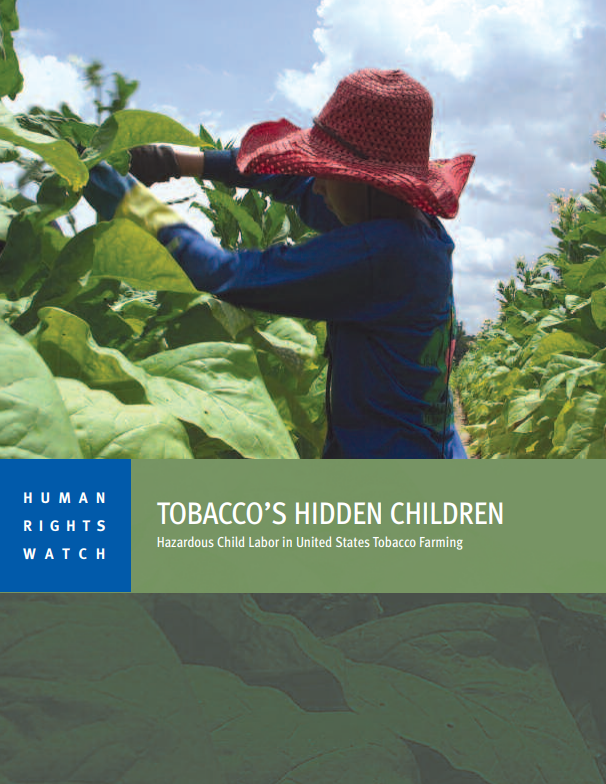Methodology
This report is based on interviews with 141 children ages 7 to 17 who said they had worked in tobacco farming in the United States in 2012 or 2013. During multiple field research trips between May and October 2013, Human Rights Watch interviewed 80 children in North Carolina, 46 in Kentucky, 12 in Tennessee, and 3 in Virginia. Eight children worked for less than a full week on tobacco farms. A few of the very youngest children—4 out of 141— worked with their parents sporadically and without pay. The median age of the children we interviewed was 15; the median age at which they began working in tobacco was 13. All personal accounts reported here, unless otherwise noted, reflect experiences children had while they were working on tobacco farms in 2012 or 2013.
Children interviewed were identified with the assistance of individuals and organizations providing legal, health, educational, and social services to farmworkers, farm labour contractors, and through outreach by Human Rights Watch researchers in farmworker communities.
In addition, Human Rights Watch interviewed three young people ages 18 to 21 who had worked in tobacco as children, and seven parents of child tobacco workers. Human Rights Watch researchers also conducted interviews with 36 experts, including representatives of farmworker organizations, lawyers, social services providers, healthcare providers, and academic researchers in tobacco-growing regions in the US. In total, 187 people were interviewed for this report.
To supplement formal interviews, researchers spoke with more than 50 outreach workers, educators, doctors, lawyers, tobacco growers, farm labour contractors, and representatives of nongovernmental organizations (NGOs) across the US in person and on the telephone. We also spoke with more than 60 adult tobacco workers in the course of our research.
Two Human Rights Watch researchers, one of whom is fluent in Spanish, conducted the interviews. Interviews were conducted in English or Spanish, at the interviewee’s preference. Most interviews were conducted individually, though some children were interviewed in small groups of two to five participants. No interviews were conducted in the presence of workers’ employers, such as farm labour contractors or tobacco growers.T
Interviews took place in a variety of settings including homes, worksites, schools, restaurants and other public spaces, outdoors as part of outreach in farmworker communities, and at religious institutions. Whenever possible, researchers held interviews in private. In a few cases, interviewees preferred to have a family member or another person present. Interviews were semi-structured and addressed conditions for children working in US tobacco farming, including health, safety, wages, hours, training, and education.
All children and parents interviewed were informed of the purpose of the interview, its voluntary nature, and the ways in which the information would be collected and used. For interviews taking place during mealtimes, Human Rights Watch provided food to interviewees. Human Rights Watch did not provide anyone with compensation in exchange for an interview. Individuals were informed that they could end the interview at any time or decline to answer any questions without any negative consequences. Participants provided oral informed consent to participate and were assured anonymity. All names of children and parents interviewed have been changed to protect their privacy, confidentiality, and safety. Some individuals approached declined to be interviewed.
Human Rights Watch also analyzed relevant laws and policies and conducted a review of secondary sources. Detailed state-by-state analysis of applicable labour laws, the enforcement of such laws, litigation, and recent and pending legislative projects in North Carolina, Kentucky, Virginia, and Tennessee was undertaken with pro bono assistance from a law firm based in New York City.
Human Rights Watch researchers obtained relevant US federal statistics and other information through public record requests to the National Institute for Occupational Safety and Health (NIOSH) within the US Centers for Disease Control and Prevention (CDC), the US Department of Labor (DOL), the US Department of Agriculture (USDA), and the US Environmental Protection Agency (EPA).
Between December 2013 and March 2014, Human Rights Watch sent letters to eight companies that manufacture tobacco products (Altria Group, British American Tobacco, China National Tobacco, Imperial Tobacco Group, Japan Tobacco Group, Lorillard, Philip Morris International, and Reynolds American) and two leaf merchant companies (Alliance One and Universal Corporation) detailing the preliminary findings of our research and requesting meetings with company officials. Nine companies responded in writing. The results of this correspondence are detailed in the relevant sections of this report, and copies of the correspondence can be found in the appendix, available on the Human Rights Watch website. In addition, company officials from several companies met or spoke by phone with Human Rights Watch in 2014.
In this report, “child” and “children” are used to refer to anyone under the age of 18, consistent with usage under international law.
The term “child labour”, consistent with International Labour Organization standards, is used to refer to work performed by children below the minimum age of employment or children under age 18 engaged in hazardous work.
The term “migrant worker” can have various meanings and many farmworkers in the US were, at least at some point in their lives, international migrants. In this report the term “migrant” is used for workers who travel within the US for agricultural work, as distinguished from “seasonal” workers, defined in this report as settled workers based in one place.

